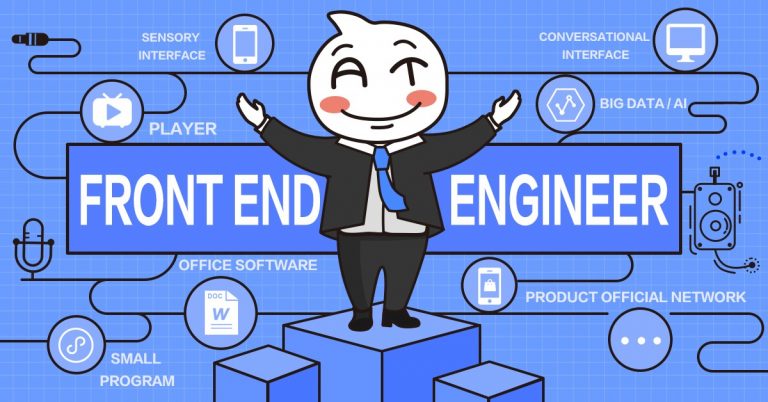Introduction:
A front end engineer is responsible for managing intricate project details that call for assessing design specifications and suggesting technical fixes to make projects scalable, maintainable, and effective. Additionally, they debug websites to correct coding errors so that end users and network administrators can utilize them without encountering any problems.
A front end developer or engineer must have excellent stress management skills and be a strong team player because they typically put in long hours and collaborate with others to ensure that all hardware and software functions as intended. Their primary tools include a personal computer, as well as well-known programmer like word processors and notepads, editors for programming languages, and various browser configurations to verify website faults across platforms.
They might work from home or in an office with other professionals who hold related jobs, such software engineers or web designers. They answer to the company’s IT manager. They should be able to adapt to new software versions and have working knowledge of numerous programming languages in addition to evaluating code and debugging programmes.
Additionally, they should be skilled with Office programmers and have a thorough knowledge of networks and databases. A front end developer or engineer also needs a bachelor’s degree in information technology. Additional credentials, such as the developer certifications from SUN, IBM, Microsoft, and Oracle, can provide applicants an edge.
What does Front End Engineer do?
The user interface systems of websites, software applications, and web-based applications are planned, designed, built, and implemented by front end engineers. Their main objective is to deliver a positive customer experience devoid of problems, mistakes, or downtime. They design and improve systems, actively participate in testing and troubleshooting, and fix problems like accessibility and browser compatibility. They frequently act as a liaison between users and backend developers, modifying tools and platforms to suit different usage scenarios.
Front end engineers often have a background in software development and a bachelor’s degree in computer science or a closely related subject. They must have a high level of proficiency using programming languages like JavaScript and CSS. It helps to have previous experience with compatibility and accessibility problems.
A front-end web developer’s typical tasks include:
- Developing concepts for a new website or redesigning an existing website while working with clients and employers.
- Knowing what information a website will contain can assist; create a plan for organizing and presenting that content on the site as a whole.
- Choosing, improving, and occasionally producing graphic aspects for a website
- Creating site prototypes that can be presented to clients and employers for their assessment and approval.
- Coding a website, and then evaluating its effectiveness.
- Sites are being watched to see if they are operating as planned, and any necessary modifications and tweaks are being made.
Qualification & Experience
A four-year degree is not usually required; however web developers almost always possess a high school diploma or its equivalent. In this business, it can often be more crucial to be able to demonstrate specialized talents through work experience and professional certificates. However, developers who wish to increase their prospects of advancing to more lucrative management or executive jobs may find that university degrees in IT subjects are advantageous.
- A Bachelor’s degree from a recognized university in computer engineering, computer science, engineering, or information technology;
- Alternatively, equivalent experience; and expertise with a variety of programmes, systems, and applications, including ReACT, CSS, UI Design, and HTML
- Can run unit testing and debugging procedures.
- Being comfortable communicating and participating in Scrum exercises.
Roles and Responsibilities of Front End Engineer
You can often anticipate a front-end developer’s role to involve any or all of the following, though there may be some differences between businesses:
- Improving user experience.
- Bringing ideas to life with HTML, JavaScript, and CSS.
- The creation and upkeep of the user interface.
- Putting design into practice on mobile websites.
- making technologies that enhance browser-independent site interaction
- Control over software workflow.
- Adhere to SEO best practices.
- Bug fixes and usability tests.
Following are the responsibilities of Front End Engineer –
- Work closely with the engineering, design, and product teams.
- Investigate emerging technologies and offer user-needs-based solutions.
- Find UI issues and flaws and come up with elegant fixes.
- Take part in code reviews and regularly ship new code.
- Create completely functional web applications that support organizational goals.
- Mentor and integrate team’s younger members.
- To establish and elucidate needs, work directly with the client.
- Accept payments while making sure that all costs and amounts are correct.
- Improve your projects by adhering to best practises.
- To test user interfaces, create high-resolution mockups.
- Complete all necessary papers and documents in accordance with the given instructions and timelines.
- Demonstrate both technical prowess and compassion.
- Redesign user interfaces to enhance speed and usability.
Required Essential Skills of Front End Engineer
There are other abilities and character traits that, like any career, can support a person’s success in this line of work. These consist of:
- An in-depth understanding of programming languages and development software is necessary for developers. While coursework in these areas is beneficial, everyday use of these tools is the only way for developers to become proficient in their use.
- Knowledge of web copywriting, content management and search engine optimization (SEO): Although most web developers won’t be expected to generate online content, having knowledge of content management systems and search engine optimization (SEO) techniques might help them communicate with other team members more effectively. To effectively manage copywriters and editors, developers who want to go into project management must become familiar with web content. Additionally, some clients with tight budgets could request copy from independent developers: The developer can provide a client with a decent site if they have some experience writing for the web.
- Knowledge about social media: Many Internet users have social media profiles. Websites and content should be social media sharing-optimized. Additionally, a lot of websites now include social network feeds.
- Listen carefully: The development of the site is a major priority for many clients and organizations. This is due to the website serving as an online representation of a person or corporate entity. People form an opinion of a website’s owner or sponsor after visiting it. Being able to listen to a client or project manager is essential to building a successful website because front-end developers are in charge of what website users view and engage with on a site.

- Strong time management abilities are necessary for a front-end engineer to deliver work to clients and employers on schedule. Every team member must be prepared to accept responsibility for delivering deliverables on time because there are so many individuals working on a single project. Additionally, a developer must be adaptable enough to change timelines when delays occur.
- Ability to comprehend and interpret site analytics: Although front-end engineers will be required to use this data when constructing or improving sites, project managers frequently assume responsibility for doing so.
- Outstanding teamwork abilities: Project managers, copywriters, back-end developers, and graphic designers frequently work on teams with front-end developers. Additionally, another team from a company’s marketing department can be giving these team instructions.
- Willingness to follow design trends: Consumers can be fickle; therefore many clients will want to retain the aesthetic attractiveness of their websites. Front-end developers must to be imaginative people who can convey concepts and brands visually.
Salary of Front End Engineer
Based on 203 incomes, the average total remuneration for a front end developer / engineer with less than one year of experience is 305,713 (ex tips, bonus, and overtime pay). Based on 1,773 salaries, the average total compensation for an entry-level Front End Developer / Engineer with 1-4 years of experience is 470,410. Based on 501 salaries, the average total income for a mid-career Front End Developer / Engineer with 5-9 years of experience is $926,361. Based on 82 salaries, the average total income for a front end developer or engineer with 10 to 19 years of experience is $1,635,057.

Source – Payscale
Final Words
In order to attract customers and keep their interest, a successful business needs a functional, appealing website. For this idea to work, a website’s front end development is essential. The wrong kind of growth drives away business in addition to producing an ugly appearance. Programming and design of a website must take into account the goals of the organization, its branding, and the demands of its visitors.



